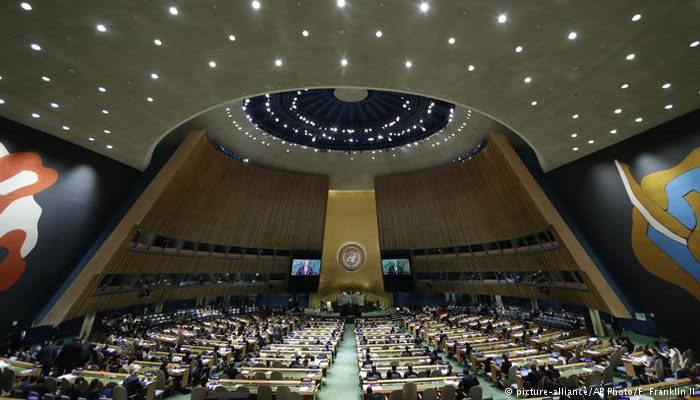+22 °C, +10 °C ... +22 °C Tomorrow:+23 °C

The UN General Assembly adopted Russian resolution on combating the glorification of Nazism, neo-Nazism and other practices that incite modern forms of racism, racial discrimination and xenophobia, a TASS correspondent reported. The document was supported by 118 countries, 49 voted against (including Canada, the United States, Ukraine and Japan). 14 nations abstained. The resolution, headlined ‘Combating glorification of Nazism, neo-Nazism and other practices that contribute to fuelling contemporary forms of racism, racial discrimination, xenophobia and related intolerance,’ was co-authored by Russia and a number of other countries, including Belarus and Syria. Among other things, it contains provisions that strongly condemn incidents related to glorification and propaganda of Nazism and welcome efforts to preserve the historical truth. The resolution also recommends taking measures that prevent the denial of crimes against humanity and review of World War Two results. On November 3, the document was put up for vote at the Third Committee of the UN General Assembly. Back then, it was amended to include a provision put forward by a number of states, including Australia, Albania and Japan. It "notes with concern" that combating neo-Nazism was named among the goals of Russia’s special military operation in Ukraine. The Kiev government was among co-authors of the amendment. Russia’s stance "A group of Western countries attempted to turn the Russian initiative into a political document, which runs counter to the resolution’s status and theme. This resolution is aimed at dialogue, at cooperation rather than at name-calling and confrontation," the diplomat said. She is convinced that by introducing the "hostile amendment" and voting against the document, certain countries "openly opposed the international effort to fight radical manifestations of racism and xenophobia." "Nevertheless, the results of the vote speak for themselves, they clearly demonstrate the international community’s unwavering support," Zabolotskaya said. |
MAMUL.am - News from Armenia, Artsakh (Nagorno-Karabakh) and the world
Republication or redistribution of MAMUL.am content is expressly prohibited without the prior written consent.
Address: 1 Charents str., Yerevan, Republic of Armenia.
Tel.: +374 (10) 55-20-59
E-mail: info@mamul.am
Tel.: +374 (91) 99-22-02
E-mail: marketing@mamul.am




























